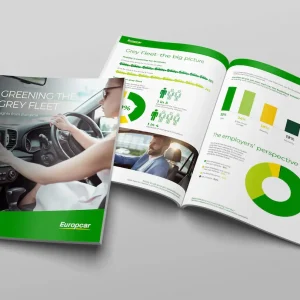The car industry is facing a transformative change as it moves towards a shared vision of the future, and fleet professionals should take a collaborative approach to get the best from the new transport options that arise.
That’s according to Lukas Neckermann, a strategic advisor to car manufacturers, suppliers, insurers and investors on the future of mobility.
Speaking at an event hosted by Europcar Mobility Group, he explained how car manufacturers are converging on the same areas of development – connected, autonomous, shared and electric (CASE) – and how this is something that fleets therefore also need to be ready for.
Discussing the different CASE strands, Neckermann said that cars being developed now would unquestionably be connected, and that this would be the basis for everything going forward.
On the subject of autonomy, he said that while self-driving cars are not here yet, advanced driver assistance systems should be specced to the highest level possible on new vehicle purchases.
On car sharing, he said that almost every car manufacturer was now offering this, in response to changing attitudes reflected by surveys where a third of respondents said they had either got rid of their own car in favour of sharing, or were considering doing so.
As for electrification, Neckermann said major uptake of this would inevitably be here soon.
“The internal combustion engine can only be improved by 1%, 2%, 3% per year,” he said. “The electric motor is giving improvements of 10-20% in efficiency, and also a cost reduction of about 20% a year.
“Depending on the study you read, whether it is 2019, 2022 or 2024, the point where you can’t improve the internal combustion engine quickly enough to begin to compete with electric motors is there.”
For Neckermann, this prospective change from the motor industry is set to coincide with a change in employees’ own attitudes, where their main instrument of mobility is not their car key, but their mobile phone, offering access to a wide range of travel options including ride hailing, bicycle hire schemes and public transport.
He explained that before, once people had acquired a car and had it outside their house, it became their default mode of transport simply because it was already there.
He continued: “Now, with people having fewer driving licences and more options, this gets thrown on its head. It enables people to pull out the phone in their pocket and then figure out how they are going to get there.”
All of this adds up to plenty for fleet managers to get to grips with – but according to Neckermann this is achievable.
“The simple step we can take now is to say ‘let’s learn about how we are using vehicles today’,” he said. “Get as much data as you possibly can on how your fleets are being used – short distances, long distances, one person or four people sitting in a vehicle.
“If you then learn, for example, that you have 200 vehicles and 100 of them are only doing 70 miles a day, you could actually electrify those 100 starting tomorrow.
“And you can think ‘can I combine some of those routes? Can I get people heading to the airport on Monday morning all from Camden to all share?’
“This is where travel management and fleet management come together.”
Neckermann said that firms should look to investigate each of the CASE areas – and also find out how others are approaching them.
“The only way we can move forward on this is to engage with each other and learn from each other, say ‘do you have electric vehicles, have you tried corporate car sharing, have you tried ride hailing?’,” he said.
“With that, you build up experience and realise it is not that hard to completely change the way businesses are run, in a way that makes them more sustainable, addresses corporate social responsibility targets, and maybe saves a little money.”
Looking further into the future, Neckermann also sees clear advantages for fleet management professionals in a world full of potentially expensive, shared autonomous vehicles.
He said: “I see a glorious future for the fleet management industry. Somebody has to own, and manage, and clean, and maintain, and move around the vehicles.
“In a world where we have roaming fleets of autonomous vehicles driving around, the key word is indeed fleet. I do see there is a need, and frankly also a business model, in owning and operating those fleets.”





